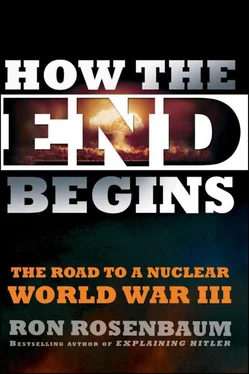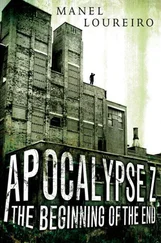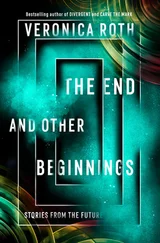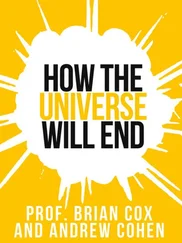Colby argues: “To those who believe we are perpetually only a minute away from the midnight of nuclear darkness, such a tradeoff [giving up national sovereignty for nuclear abolition] may be, if not appealing, simply a necessity. To those who value the independence of nations or who see world government as a recipe for gross inefficiency and unresponsiveness if not tyranny, and who can bear the tension of a cold peace, the abolition project is to be resisted.”
It’s a strong counterargument to Zero. But before agreeing with Colby, and his “cold peace” alternative to Zero, it’s worth listening to the arguments of one of the most prominent and unexpected Zero advocates. He is Ambassador Richard R. Burt, former New York Times defense correspondent, Reagan-Bush–era nuclear arms negotiator, widely regarded by both sides as one of the smartest, most lucid Cold War nuclear advocates. [308]And he does not consider himself a penitent for his role in speaking up for nuclear readiness when he was in the State Department. It’s not a warm and fuzzy thing for Burt, nuclear abolition, but a cold-blooded national interest calculation.
Burt had cogent reasons he gave me. But it still mystified some.
“Rick Burt! An abolitionist?” was the reaction I got from one of his former colleagues at the New York Times.
My talk with Burt about his conversion to Zero was illuminating.
“I’m just a tool of Bruce Blair,” [309]Burt began jocularly over the phone from his Washington office in June 2009. He was trying to explain why he’d just gone public as the most well-known nuclear diplomacy expert backing the Global Zero Initiative at a press conference at Washington’s St. Regis Hotel ballroom. He and an international panel unveiled Global Zero’s four-step blueprint for getting to Zero before 2030. [310]It was a week before Obama’s summit with Medvedev in London and Blair and Burt had had conversations with Obama’s nuclear negotiators and Russian technical advisers to the START treaty. Among an array of international luminaries endorsing the Zero nukes plan was one of Medvedev’s top nuclear advisers, Igor Yurgens. [311]
But more surprising in a way was the presence—the dominance at the conference—of Burt, who brought all his intellectual and rhetorical skills, his years of nuclear negotiation expertise to the challenge Obama had set out. His role was particularly ironic, almost shocking since he had been as responsible as anyone for killing any hope of making Zero an objective in the Reagan administration as Reagan occasionally, fitfully, probably sentimentally sought to do. Just a week before I spoke to Burt there appeared an op-ed reminiscence of Burt’s role in body-blocking Zero at a crucial moment in Reagan’s second term. It was an anti-Zero op-ed [312]written by one of Burt’s former State Department colleagues, John Hughes, who had left the State Department to become editor of The Christian Science Monitor (now retired). In his June 18, 2009, piece, Hughes offered this shocked-sounding recollection of new Zero point man Burt in his previous anti-Zero incarnation:
When Ronald Reagan was president, he scheduled a weekly one-on-one meeting in the White House with Secretary of State George Shultz. Nobody else was present, so when Shultz returned to the State Department, four or five of us senior advisers were always eager for a debriefing on what had been discussed and decided.
On one of these occasions, Shultz returned to announce that Reagan had become committed to ridding the world of nuclear weapons. A startled Richard Burt, then assistant secretary for European affairs, blurted out: “He can’t do that!” following up with the conviction that replacing the US nuclear deterrent with conventional weaponry and troops would be of astronomical cost.
Shultz stared at us with those pale, impassive blue eyes that had served him so well as a negotiator in private life and government. You guys “had better get on the ball,” he said. The president meant it, he said, and we were to work toward it.
Instead they killed it.
“I remember long arguments with George Shultz,” Burt told me when I spoke with him, “in which I made the case, this [abolishing nukes] is destabilizing, counterproductive, it will weaken our alliance system. I saw nukes as a stabilizing factor.”
I asked Burt what he thought about the recent trend in popular biographies and histories that makes Reagan seem like a secret peacenik, a tender no nukes dove whose dream of Zero was strangled in its cradle by a sinister cabal of hawks that included Burt. He laughed and diplomatically found a way of saying that, yes, Reagan cared passionately about the weight of responsibility contained in the nuclear football that followed him around (so appropriate, a football for the Gipper). But the subtext I got pretty strongly from Burt was that this posture was fuzzy and sentimental—a not serious wish that was not very consistently or powerfully pushed by the president and was quickly abandoned when Soviet leader Mikhail Gorbachev wouldn’t sign on to another cherished Reagan fantasy: Star Wars.
And now, Burt has switched sides dramatically. Though he wouldn’t say his principles have changed; rather the facts of the new nuclear age have. In his new incarnation as a hardheaded prophet of Zero, Burt, along with Blair, came up with an action plan for the summit that was meant not to scare the diplomats: the goal of Zero would be incremental, to be achieved between now and 2030. There would be intervals of sharp reductions and then… The only place where the Global Zero action plan becomes a bit wish-fulfillment dreamy is in its final phase, where the two superpowers will have to relinquish their last nukes and, in primitive zoological terms, bare their bellies to one another, displaying their no nukes naked vulnerability—and trusting to some unspecified international authority to provide continuous international “intrusive” inspections and an enforcement power to make sure nobody “reconstitutes” their nukes or pulls a “break-out scenario,” in which a small group of nuke assemblers suddenly tells the de-nuclearized world they’re now the only nuclear power, and presents everyone with a list of demands.
This leads to the obvious question: wouldn’t the inspection regime require explosive weapons powerful enough to blow open sealed underground bunkers where prohibited nuclear mischief might be going on? Wouldn’t that regime require large sums of money for the most sophisticated nuclear detection devices, all to be supplied by the nations they’re supposed to be strict with? In fact, the inspection regime would somehow have to be the most powerful political entity on earth, perhaps relying on a monopoly of nuclear weapons itself, and thus deterrence, and we’re back where we started, only it may never happen because the superpowers are going to treat any version of that idea like kryptonite.
The problem with the John Lennon strategy—“Envision Zero” as the Zeroistas were in effect saying at that first press conference—is that the more you envision Zero the more like a mirage it seems.
Burt admits the final stage will be the hardest to conceive much less execute, but he argues that the cumulative trust-building effects of the arms reduction to near-Zero will encourage confidence in the final step across the final line.
When Burt said “I’m just a tool of Bruce Blair” he said it jocularly, but it turned out Blair had been the key to Burt’s conversion. He’d known Blair for three decades since they were both at London’s elite think tank, the International Institute for Strategic Studies. And they’d remained in touch even as their career paths diverged and their attitude toward nuclear weapons did as well. Blair’s bringing Burt over helped confirm something I’d begun to feel about Blair. He had had some remarkable, almost uncanny powers of persuasion, a kind of low-key charisma, even perhaps a mesmeric effect on people. It had something to do with the fact that he wasn’t just another policy wonk or just another wide-eyed peacenik. He was a deep student of the strategic and technical aspects of nuclear weapons. More importantly, it had something to do with having had his hands on the keys. He was like those figures who visit the Underground in Homeric and Virgilian mythology and then return to life aboveground having gained—and being known for—some kind of near-mystical authority. He had had the power in his hands to murder 20 million people with a twist of a key. Somehow this kind of power had an effect that worked unconsciously on those who listened long enough. He was the Ancient Mariner who’s been on the death ship so long that an aura of dread clung to his words.
Читать дальше











